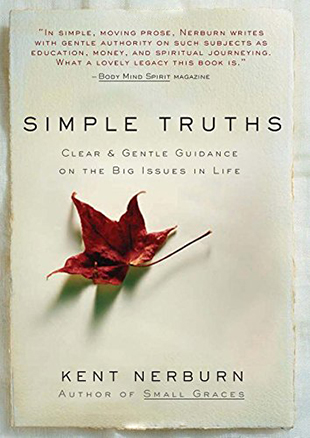Ever since we read Letters to My Son, we have eagerly looked forward to each new book by Kent Nerburn. We savor his fresh way of looking at things and the spiritual perspective he brings thanks to his appreciation for Native American wisdom. In this rich and meaningful collection of observations about life, he again proves himself to be both a sensitive writer and a connoisseur of the mysteries of life. In the introduction, Nerburn states how important it is in these difficult times to speak from the heart. We agree. The author presents his ideas as a father and as a friend, two roles in life where one is challenged to be nurturing: "If I can offer something of value, it is this: a vision of life that acknowledges our human condition while remaining hopeful about our human potential; a voice that speaks with compassion and empathy about the world in which we live; and a viewpoint that seeks common ground from which to survey the vast and confusing landscape before us."
One of the sources of Nerburn's way of looking at things is that he is a lifelong learner who keeps expanding his horizons and cherishing even the trivialities as something worth exploring. Or to put it another way, he is a practitioner of wonder: "Education is one of the great joys and solaces of life. It gives us a framework for understanding the world around us and a way to reach across time and space to touch the thoughts and feelings of others. But education is more than schooling. It is a cast of mind, a willingness to see the world with an endless sense of curiosity and wonder." Best of all, "the true measure of your education is not what you know, but how you share what you know with others." Now there is something we can all aspire to with great ardor: sharing our enthusiasms with others. Nerburn certainly has done so in his long writing career. That same spirit of sharing informs his commentary on possessions: those who remain so attached to what they own are losing track of what really matters, having fewer things and enjoying them more.
Native Americans always had plenty of time for solitude and silence. They looked at the natural world and saw the benefits of both : "The mountain is not restless in its aloneness. The hawk tracing circles in the sky is not longing for union with the sun. They exist in the perfect peace of an eternal present, and that is the peace that one only finds in solitude." Nerburn concludes that this is the best antidote to loneliness.
One of the many spiritual practices explored in this volume is mystery. In these times, there are still many among us who are afraid of not knowing, so they cling tenaciously to answers or systems of thought that promise security. In essays on love, death and the unknowns that swirl around us in our quest for meaning, Nerburn writes that mystery brings us a peace that almost defies description. The author salutes it in the bonds that tie together certain couples who have been married for a long time and still evidence a glow in each other's presence. He also finds mystery in his experience of an eclipse of the sun that brought him to a deeper appreciation of dying. And in the last chapter, Nerburn pays tribute to mystery: "When all the words have been written and all the phrases have been spoken, the great mystery of life will remain." What is our role in this mystery play? "It is up to us to infuse this dream with light, and to cultivate, as best we are able, the ways and habits of love."
